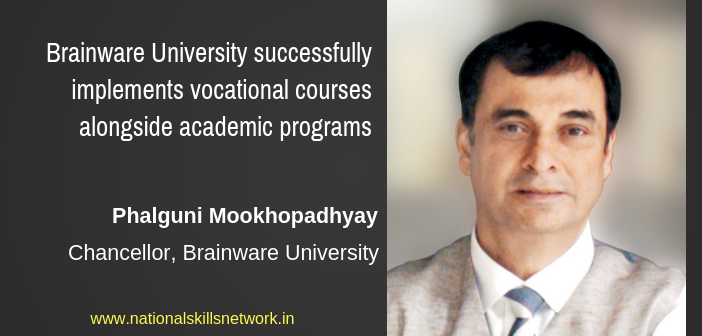Brainware University has been offering various short-term and long-term skill-based courses along with the regular degree programs. Besides demonstrating the success of industry-integrated curriculum, these courses have created many options for the students become employable. In this Skill Story, Phalguni Mookhopadhyay, Chancellor, Brainware University, shares the journey of the institution and insights into current initiatives in skill development and vocational training for empowering future workforce.
Q: Please tell us about your experience in offering Skill Development Courses alongside mainstream Degree and Diploma. What are the challenges and responses to Skill Development Courses?
A: We have been offering Skill Development Courses with NSDC and a few State Governments for the past 4 years or so, along with our Engineering, Management, Computer Science and other mainstream degree courses. I cannot say this is entirely a new experience for us. Since 1990, when we were a computer training institution, we were offering a range of courses in Information Technology- Financial Accounting, Desktop Publishing, Hardware, Networking, Multimedia and Programming -that were essentially paid “ Skill Development Courses “. Although the term “Skill Development“ was not so much in vogue in the 90s and early 2000.
It was only from 2008 that we started offering mainstream diploma and degree courses. Therefore, we were in a way going back to our roots when we joined NSDC as a partner and started offering a range of Skill Development Courses. Although the size of the market and the scope of training have both changed now.
The response to Skill Development is definitely positive if we look at it strictly from the point of view of our organisation. It is difficult for me to comment on the Pan-India scenario except what we are able to gather and understand from the published data. What we have understood that the overall response is encouraging given the enormous size of the operations.
There is no dearth of job vacancies. It is not difficult to place 70-75 % of the students after completion of a course if the candidate is interested in joining and continuing with a job. More often than not, the candidates do not even turn up for the job interviews, and even if they do, most of them are not prepared to relocate to job sites that are not close to their place of stay. There is yet another group, who quit their jobs after a month or two either because it is too “strenuous “or proper “homemade“ food is not available. We get several different explanations for not continuing with the job.
Q: You have partnered with several State Skill Missions and have been offering courses under the PMKVY and DDU-GKY schemes too. How has this experience been and how successful have you been?
A: If we judge success in terms of mobilisation and teaching, I would say we are very successful. But, we have not been able to retain 100% of our students till the end of the course. We have not been able to get all the successful students to agree to accept a job, and finally convince all the employed students to continue with the job. So I would say we have so far been only partially successful.
Our performance in DDU- GKY scheme is better. There have been less than 1% dropouts. Attendance has been very good. Improvements in self-confidence, appearance and subject knowledge were visible among the students within a month of commencement of the programme. Placements have been 100%. So on the whole we would say DDU- GKY is a success story. The primary reason is we get far more time to spend with the students as this is a residential programme.
Q. How do you assist and ensure the students who have passed out are able to secure placements?
A: We have a large pre-placement training cell and a vibrant placement cell that is working in all the districts, at all the times of the year arranging for placement drives.
Q: What are your future plans and how are you updating the curriculum to include future skills?
A: We wish to integrate Skills Training with our University curriculum and offer a wide range of higher- level paid skill courses that require sophisticated tools, equipment, lab and workshops along with the courses that we are offering now. We offer a large number of courses from over 28 sector Skill Councils. It is difficult to pinpoint a small group of courses that are more popular than others.
Q: What is your message for those who are in the skill development space?
A: Let us all be honest to our profession. If we follow the rules and impart training, the benefits would surely come because the instructions are very clear and comprehensive.
Q: What is your training methodology and how do you train your trainers in the context of skilling courses?
A: Emphasis on practical classes coupled with personality development programme yield the best results in terms of students’ satisfaction and placements. We have a quality management cell that trains and retrains the faculty members. Faculty training programmes are an on-going process.
Q: Do you want to mention any other points?
A: Although numbers are important and there is a huge national target to be met, I feel residential programmes backed by proper infrastructure and teaching experience will lead to meaningful training and placements. Training offered by small, inexperienced vendors is a waste of taxpayers’ money.













